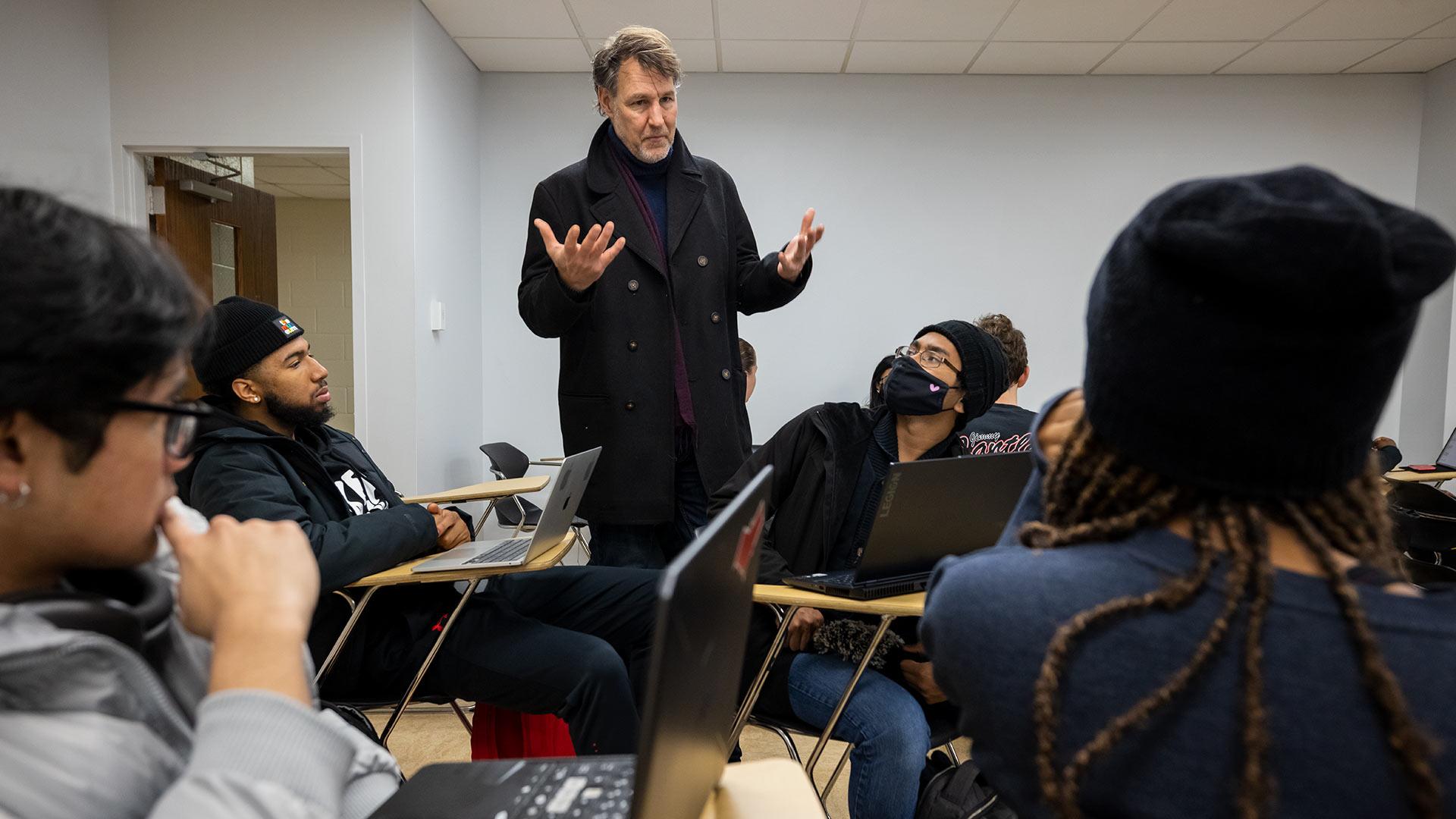
Upbeat music greeted students arriving in Professor Kevin Roy’s classroom—his attempt to keep the mood light while they prepared to tackle some of the darker topics associated with men’s lives, from mass shootings to opioid use to suicide.
There’d be no lecture today, he told them. Instead, groups of three to five students pushed their desks into clusters and got to work, discussing how their chosen subjects for health literacy posters tied back to the class’s overarching focus: masculinity and how it affects family health and well-being. In this project, demonstration of art skills takes a back seat to pursuit of insight.
“We’ve learned some of the reasons men have a higher rate of violence is because they have trouble expressing how they feel. They let that anger out through violence,” said Tori Best ’26. “Society accepts men being angry because it’s masculine, but crying is seen as feminine.”
“And once they’re seen as feminine, [people] take advantage of it,” said Khris Love ’25.
Roy launched the I-Series class, “Man Up: Health, Masculinities, Families and Inequality,” in 2017, and it’s now among the Department of Family Science’s most popular offerings—and why academic publisher Cognella recently honored Roy with its 2022 Innovation in Teaching Award for Family Science.
“We don't often create spaces to talk about what masculinity means and some of the ways in which we socialize young men,” said Sandra Quinn, professor and chair of the Department of Family Science and senior associate director of the Maryland Center for Health Equity. “Part of why this class works and why it’s such a draw is Kevin has created a space where you can have those conversations. What does it feel like to be a young man? How are young men socialized? What does that mean for their relationships, for their families, for the kinds of health risks they may encounter?”
Roy bases the curriculum around his work with low-income families and community-based parenting programs, along with his research focusing on young men on the margins of kin networks and the workforce as they transition into adulthood and fatherhood. Themes include adolescent development, adulthood, the role of men as providers and caregivers, exposure to violence and how structural racism and historical experiences impact men in families.
“There’s a view that masculinity is toxic, and I think in this class, students realize it’s more complicated than that,” he said. “Men are more complicated than that.”
Roy wasn't always headed for a career in teaching. The California native majored in international affairs with a focus on Soviet studies at Georgetown University, where former Secretary of State Madeleine Albright served as his adviser.
“But after graduating, I taught high school in South Africa for a year, and it was the best thing I've ever done in my life,” he said. “I realized I love to teach, and I was also very interested in equality, racism and identity.”
He enrolled at Northwestern, where he earned his master’s and doctoral degrees in human development and social policy. Around the same time, Roy began working as a case manager for a fatherhood program in Chicago’s South Side that promoted positive involvement of low-income fathers in their children’s lives. The experience solidified his interest in fatherhood research.
Since joining the School of Public Health in 2005, Roy has led several research initiatives around men’s health, social policy and fatherhood. “Man Up” brings together the “best things” he has ever worked on, he said.
Over 200 students enroll annually—more than three-quarters of them students of color, first-generation students or from immigrant families. At least half in any given semester are women.
“They’re trying to figure out what’s going on with guys,” Roy joked.
That includes students like Elizabeth Early ‘23, M.P.H. ‘24. During the class’s student-father interview project, she asked her father about emotional moments in his life, including the death of her older brother. The interview, and what she learned in the class, helped Early understand how he processed grief.
“The interview challenged him to answer uncomfortable questions,” Early said. “My older brother died when he was 19, and this event left my father feeling extremely guilty and upset for the rest of his life … While losing a child is incredibly painful, I learned how it might go against being masculine to present these emotions and grief.”
These interviews are a sort of “intervention,” Roy said. Under the guise of an assignment, he’s found, fathers often open up more than they would during a regular conversation with their children.
“Students say, ‘I’ve never talked to my dad like this. I feel closer to him now,’” Roy said. “Or, ‘He was emotional with me for the first time. He cried about this.’ One student whose dad was incarcerated, talked to this dad for the first time in 10 years because of this project. It’s an opportunity for growth in that relationship.”
While the impact of men on family health is always evolving, Roy said this generation of students has a more open perspective on gender roles than those in the past.
“Who are we supposed to be as men?” he asked. “People have been asking that question for over a hundred years. But things are changing. I haven’t run this class once when it wasn’t completely full … Students really like this course, and it’s not just because it’s fun. It’s because it’s relevant. It’s giving them a way to rethink really challenging issues that are personal and impact them every day.”